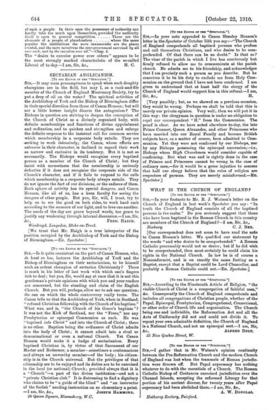[To TER EDITOR Or THE "SPECTATOR."]
SIR,—Is it quite consistent on the part of Canon Henson, who, de haul en bas, lectures the Archbishop of York and the Bishop of Birmingham on their sectarianism, to he himself such an ardent champion of sectarian Christianity? There is much in his letter of last week with which one's fingers itch to deal; but you, Sir, would say at once that it is not this gentleman's private opinions with which you and your readers are concerned, but the standing and claim of the English Church. But you will, perhaps, allow me to ask one question; the one on which the whole controversy really turns. The Canon tells us that the Archbishop of York, when in Scotland, " refused Christian fellowship with the Church of his baptism." What was, and is, "the Church of his Grace's baptism " P It was not the Kirk of Scotland, nor the "Frees," nor any Presbyterian or episcopal Communion as such. He was " baptised into Christ" and into the Church of Christ; there is no other. Baptism being the ordinance of Christ admits into the body of Christ ; it cannot admit into a rival or denominational or even a national Church. Yet Canon Henson would make it a badge of sectarianism. Every baptised Christian is, by virtue of that Sacrament of our Master and Redeemer, a member—sometimes a contumacious and always an unworthy member—of the body ; his citizen- ship is in the Church universal. But the privileges of that citizenship are to be enjoyed and its duties are to be exercised in the local (or national) Church ; provided always that it is a " Church "—a part of the divine institution—and not a "private Christian club." It is distressing to find a dignitary who claims to be " a guide of the blind " and " an instructor of the foolish" needing instruction on so elementary a point.
—I am, Sir, &c., JOSEPH HAMMOND. 38 Queen Square, B/oomsbery, W. C.














































 Previous page
Previous page